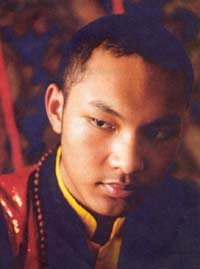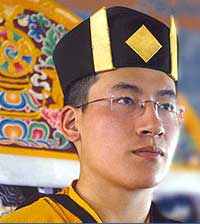Fists fly over living god's crown
By Randeep Ramesh, The Guardian, October 4, 2005
Tibetan Buddhism One million followers and pounds 600m in assets are at stake in fight for title of 17th karmapa
Gangtok, India -- On a narrow winding lane on a Himalayan mountainside, past Indian army soldiers and burly, shaven-headed monks, lies a monastery at the centre of a feud which has split normally gentle Tibetans who revere a living god crowned with a black hat.
 << Ogyen Trinley
<< Ogyen Trinley
Two rival factions of Tibetan Buddhism are fighting for control of the 75-acre site of the Rumtek monastery, a few miles outside Gangtok, capital of the Indian state of Sikkim. The rivalry is such that there have been violent brawls between the monks, accusations of graft and corruption and a travel ban placed on the protagonists by Indian authorities, who want to keep a lid on Tibetan passions. The result is that Indian security forces guard the monastery and the priesthood is split by a bitter legal battle.
The fight is over Rumtek's crown, the 20cm-high "black hat" said to be woven from the hair of female deities. When the Dalai Lama fled to India in 1959 the Buddhist clergy relocated their religion's seats of power and holy relics. Rumtek, on the edge of the Tibetan plateau, became the headquarters of the Kagyu sect. Wearing the Kagyu's black hat, the head of the order - known as the karmapa - presides over a sect with assets estimated to be worth pounds 600m, the allegiance of 350 monasteries worldwide and 1 million followers.
 Thaye Dorje >>
Thaye Dorje >>
Observers say much of Rumtek's reputation was built up in the 1960s, when hippies made pilgrimages there and built up monasteries in America.
"It is a mystery as to Rumtek's exact wealth. But that it is worth fighting over, that is clear," said Vijay Kranti, a journalist who has written extensively on Tibetan affairs. "In the community religion is the major activity and occupies a very big space in people's lives. The previous karmapa had built up a huge following in the west."
In Tibetan Buddhism, as one karmapa passes away another is reincarnated. Since 1110, the karmapa has been reborn in an unbroken string. His lineage is three centuries older than that of the Dalai Lama. The trouble is there are two claimants to being the 17th karmapa - Ogyen Trinley and Thaye Dorje - each supported by important lamas, or priests, from the Kagyu lineage. The majority of the lamas, the Dalai Lama, and Tibetans inside and outside Tibet have supported Ogyen Trinley. Even Beijing supported his claim as the 17th karmapa, although he fled Tibet in 1999.
But Shamar Rinpoche, one of the regents of Rumtek - essentially stewards until a karmapa becomes an adult - disputes this vigorously. He has flooded the courts with petitions and his monks have often used their fists in support of his candidate Thaye Dorje, who has just returned from an inter-faith conference in London where he was billed as the karmapa.
"We were cheated out of running Rumtek, even though we were supposed to be in charge. But we will continuing fighting for the good of the community. The courts will give us justice," said Narendra Jaswal, of the Karmapa Charitable Trust, which backs Thaye Dorje.
A decade ago Rinpoche enthroned a bespectacled boy named Tenzin Chentse, whose parents, he said, were Tibetan refugees. The boy was later named Thaye Dorje. When Mr Rinpoche tried to bring him to Sikkim, there was a melee and the boy spent the next few weeks under the guard of 300 monks. Mr Rinpoche was subsequently barred from entering Sikkim.
Many followers of this feud say that the contest will be settled not by the courts, where the case has languished for seven years, but by Ogyen Trinley's birthday next June. Rumtek and its properties are owned by a charitable trust which will be dissolved when the karmapa reaches 21. "When that happens all bets are off," said Pema Wangchuk Dorjee, editor of Sikkim's largest circulation newspaper, Sikkim Now. "The fact is then the squabble is immaterial because whichever of the two will be 21 is going to be crowned karmapa."
There will almost certainly be claims that Ogyen Trinley has crossed that threshold first. His supporters have lobbied state ministers to lift a travel ban preventing the "living god" from visiting Sikkim. "We are planning a party and a big homecoming for his Holiness," said Karma Chungyalpa, general secretary of the All Sikkim Buddhist Organisation. "The other side's boy is already 23, according to our research, and they have not made any fuss about him. It's inexplicable apart from the fact they know the game is up."
The argument over which of the two boys comes of age first is a non-issue for the other camp. They say the return of the 17th karmapa cannot be decided by a birth date. "This is a spiritual decision, not one for the courts or Indian law," said Mr Jaswal. "The karmapa is a karmapa because of his soul, not thanks to his age."
Secular and religious leadership have always been intertwined in Tibetan tradition, and reincarnation politics has proved in the past to be difficult to negotiate. But much rides on Ogyen Trinley making it as the karmapa. Many see him as a successor to the Dalai Lama. "He has spent much time on poetry and music. But he is a mature Buddhist and is needed by everyone, not just Rumtek," said Jamyang Dorjee, a former aide to the Dalai Lama.

 << Ogyen Trinley
<< Ogyen Trinley Thaye Dorje >>
Thaye Dorje >>